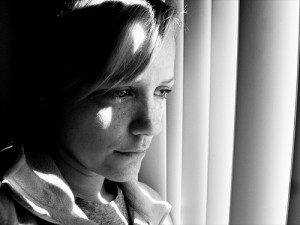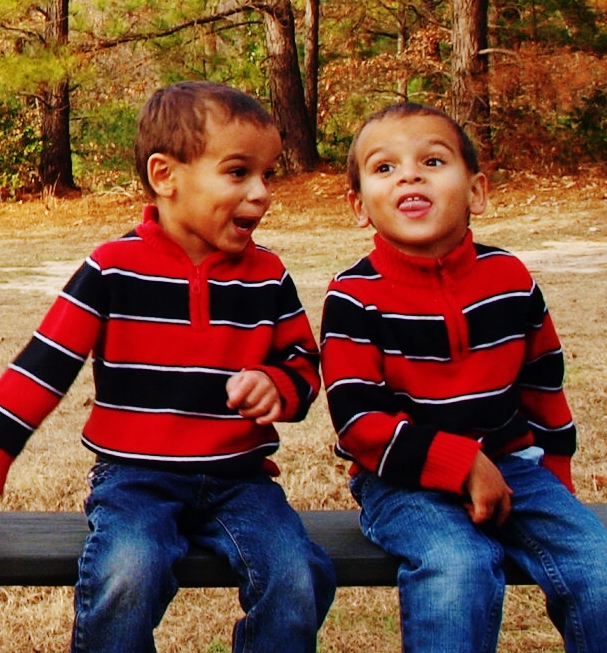The baby books tell you normally developing kids progress in a steady forward fashion – smile at 6 weeks, roll over at 4 months, babble at 9 months, walk by one year. The babies gracing the covers of these books are always dimpled and serene in their baby/toddlerhood, seemingly reaching all their milestones gleefully and effortlessly.
This was not my family’s experience.
My twins, in particular, seem to have missed the memo on “normal baby development.” I told myself there were legitimate reasons for it: prematurity, multiple-kids-close-in-age household (“Irish triplets“), legal blindness, being male, etc.
Still, all these reasons (though definitely hugely influential) never seemed to fully explain the missing pieces of the puzzle. Their sum of “handicaps” (literally in the case of vision) were surpassed by the amount of delays. At least this seemed to be the case to the professionals and me.

At 24 months, I had them evaluated by BabyNet (South Carolina’s interagency early intervention system for infants and toddlers under three years of age with developmental delays, or who have conditions associated with developmental delays). The result? They eked out a score in the 1st and 2nd percentile of talkers and were recommended to a developmental pediatrician.
Then they qualified for free public (special ed) preschool at our local district with delays in both speech and social development. We’ve had our share of professionals pressuring us to begin early intervention for our twin boys. And we followed up, providing them with various recommended therapies.
All this is “the facts.”
Emotions can be quite different.
I’d like to tell you I’m the mom who is never discouraged, who is always fighting the good fight for her boys and never giving up – not even for one second. I’d like to say I have never had the shadow of guilt or self-blame cast over me.
But that would not be MY story. I am human; how could I not be discouraged or have guilt about what was happening with my sons?

Raising a child is full of “not knowing.” Not knowing what you are doing right or wrong. Not knowing where to place the balance between hoping for a miracle and accepting the truth. Not knowing why your children are the way they are, or how to most efficiently help them.
If my parents are any indication, even when your children are adults, you still struggle with not knowing where they are or if they are safe at any given moment. (My mom heard about a wreck on the radio … could it be my daughter … ?)
To compound the problem of all the uncertainty is the advice that everyone feels compelled to give. Strangers on the street, friends and family, magazines in doctors’ offices, know-all commercials, the internet (!) etc. etc. etc.
Don’t get me wrong, some advice is good. But even if a new mother is showered with nothing but good advice, her mama instincts are in jeopardy of drowning with all those well-wishing intentions. Even the most self-confident mom has moments of insecurity and second-guessing her decisions, which promotes self-doubt of her abilities to effectively parent. This behavior is normal and to be expected.
Ideally, what happens to moms is after a few years of sifting through motherhood, you find your stride and get back in touch with your instincts. And slowly, that’s what happened to me.
My instincts told me that my boys needed to placed in a sink-or-swim kind of classroom. I sought the opinions of family and the professionals who worked with them. I prayed about it. I considered what professionals told me and educated myself as thoroughly as possible.
Then I made a decision.
Though everyone advised against it, I took them out of the therapy-rich environment of the “developmentally delayed” public preschool (where they were showing little progress), and put them in the exact opposite environment. I enrolled them in a full-day, high-academic, immersion program, full of “normal” kids. I figured, if they were having trouble with English, why not throw another language in there and let them sort it out? If they are behind in socialization, why not put them smack-dab in the midst of rowdy, energetic kids?
For the first month, I held my breath and was convinced I had messed up big time. I prayed so hard and continued to feel my decision was the best choice. But I couldn’t help but wonder if my desperation overshadowed good judgment. What if I misinterpreted what I thought was the answer to my prayers?
After a month at the new school, we had an IEP (Individualized Education Program) meeting to discuss how the boys were doing. All faces were solemn around the table. Shortly there afterward, the principal called and said she thought they should only attend part-time after the holidays.
Then a miracle occurred.
All of a sudden, everything clicked into place in their young minds and BAM! They progressed so quickly I had to take care not to let them spin me ’round. Their vocabulary exploded like wildfire. They were laughing and had friends. (In fact, one of my three-year-olds has not one, but TWO “girlfriends”!) The teachers and therapists all went out of their way to tell me how proud they were of my boys and their sudden progress. Better yet, my children could understand my sentences. They talked amongst themselves. Our family could truly communicate.

I don’t discount the possibility that their giant leap forward might have happened no matter which school they were attending. However, as a believer in nature and nurture having almost equal effects on people, I think the rich environment of the public preschool was (and still is) a wonderful place for their minds to bloom.
I could not be happier! I may have had my moments of doubt, but my sons flourished and excelled despite me.
This isn’t supposed to be a story of “mainstreaming” as the solution for everyone. Every child is different, so learning styles are different too. This is a story about finding and trusting yourself as a mother of children with different abilities, rationally searching for answers, and making a leap of faith.
Have you dealt with a situation where you trusted your mama instincts to make the best decision, despite what others thought? Tell us more about it below!














